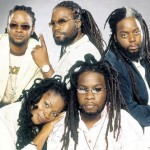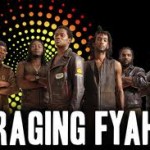
Raging Fyah—-
Six years ago the Jamaican reggae group Raging Fyah were asked to appear as the backing band in the video for singer Alaine Haughton’s “You Are Me,” filmed at Wickie Wackie Beach, located in the Bull Bay community on the island’s southeastern coast. Upon reaching the video shoot’s location, bassist Delroy “Pele” Hamilton immediately called lead singer/rhythm guitarist Kumar Bent and told him he had found an ideal venue for the band, despite its only available amenities being a weather-beaten stage, a rugged shoreline and the majestic Blue Mountains looming in the distance.
“I had said that the way for us to get our name out there was to put ourselves on a stage because no one was booking us,” recalled Kumar. “So I went to look at the beach and within a month we had put a live series together there; we moved fast because we had to find our niche.”
The monthly Wickie Wackie Live concert series became a welcoming performance space for young Rastafarian reggae acts. Some of the earliest performances by the most popular acts in contemporary Jamaican music took place at Wickie Wackie, including Janine “Jah9” Cunningham, Jesse Royal, Kabaka Pyramid,No-Maddz, Protoje and a (then) teenaged sing-jay named Jamar — who would soon attain international renown as Chronixx. Incorporating elements of dancehall, hip-hop and dub poetry into the drum and bass-driven rhythmic pulses that have defined one-drop reggae since its late ’60s inception, these artists comprised a vibrant movement cleverly branded as a Reggae Revival by Jamaica-born, now D.C.-based author/selector Dutty Bookman.

But what some consider a revival others view simply as the latest embodiment of reggae’s ongoing development. Throughout the 1970s, often referred to as reggae’s golden age, numerous pioneering Jamaican acts including Jimmy Cliff(and The Harder They Come film/soundtrack) The Wailers, Burning Spear andThird World took reggae and its accompanying Rastafarian culture to an enthusiastic worldwide audience.
Less celebrated within the music’s trajectory is the Rastafarian roots resurgence of the 1990s, which occurred alongside dancehall reggae’s breakthrough in the US with both styles attracting major label interest. Cultural sing-jays Tony Rebel,Capleton, Buju Banton, the band Morgan Heritage, and singers (the late) Garnet Silk and Luciano are just a few of the Jamaican Rastafarian acts that garnered immense local and international fame, not to mention major label deals, in the 1990s. Sing-jay Sizzla came to prominence in the later 90s, profoundly impacting both roots reggae and dancehall, with powerful and occasionally profane lyrics; he would establish a brief association with the Damon Dash Music Group in 2005. Roots reggae also surged again in Jamaica in the mid ’00s through the music of the band Rootz Underground, singers Duane Stephenson, Etana, Jah Cure andRichie Spice, among others. Tarrus Riley‘s hit “She’s Royal”, which references the coronation of Ethiopian Emperor Haile Selassie I alongside his wife Empress Menen Asfaw (a momentous occurrence in the development of Rastafari) within the context of a love song, is arguably the most adored reggae single of the noughties.
“With each decade reggae has continued to evolve, although it maintains a core sound, but every new voice tweaks that sound; what is consistent is the conscious intent expressed through the lyrics. That’s why a band like Raging Fyah can come through with a sound that echoes the past but still augurs the future,” says Kingston based industry veteran Andrea Davis, a former booking agent for the band and founder of International Reggae Day (IRD) observed annually on July 1.
Davis views Raging Fyah as “a next generation Third World. They are creative songwriters with material that is well suited for radio and can open doors in the media space that haven’t been knocked on in a while.”
The 2013 video for Raging Fyah’s radio-friendly, smile inducing “Irie Vibe” was shot on GoPro Cameras by SteadyImage director Adrian Allen and IRD producerAngiel Shaw and was used by GoPro that year for their worldwide in-store retail campaign.
Three of Raging Fyah’s five members Demar “Keysie” Gayle (keyboards, backing vocals), Anthony Watson (drums, backing vocals) and Delroy “Pele” Hamilton (bass, backing vocals) met while studying music at Kingston’s Edna Manley College of the Visual and Performing Arts under the tutelage of Ibo Cooper, former keyboardist with the legendary band Third World. They enlisted veteran guitarist Courtland “Gizmo” White and formed Inside Out in 2002 before changing their name to Raging Fyah in 2006. They spent years backing artists at major stage shows in Jamaica; their long held ambition to perform original music became a reality when Kumar signed on as lead singer in 2010. Kumar attended Edna Manley a few years after his band mates, initially studying piano; at Ibo Cooper’s insistence he began writing and singing his own songs.
Raging Fyah collectively writes all of their material; Kumar’s pliant expressive tone easily conveys personal reflection (“Brave”), spirituality (“Jah Glory”), and social angst (“World Crisis”), each mood complemented by the band’s finely honed, impeccably tight grooves.
“Within reggae’s history so many great artists like Tarrus Riley, Sean Paul have passed through VP so their machinery will help us reach much farther than we can on our own, especially in the US,” Kumar told Billboard in an exclusive interview related to the signing. VP will handle Raging Fyah’s merchandising and publishing, Justin Hill of United Talent Agency is responsible for the band’s North American bookings and Ari Bernstein of ICM Partners handles their international bookings.
VP established Dub Rockers to specifically target the American reggae scene, which has experienced a proliferation of homegrown bands over the past 10 years, particularly in California and Hawaii. America’s top reggae acts broke out of regional scenes and went on to national, then international success through near incessant touring, which Raging Fyah’s manager Lukes Morgan of Prestige Artists Worldwide Inc says is crucial to the longevity of any reggae artist’s career.

“You can’t look to be a radio act and survive in the reggae business because reggae isn’t playing on radio; most of the popular American reggae bands aren’t played on radio either, but they dominate the reggae played on streaming services because they tour so much, that’s how people know them,” states Lukes, better known to reggae audiences as the guitarist and manager of the band Morgan Heritage, which features his sister Una and brothers Gramps, Peetah and Mojo. Morgan Heritage rank among reggae’s busiest touring outfits; they recently wrapped the very successful Catch A Fire tour across the US with Damian and Stephen Marley and Tarrus Riley.
“Some pop radio artists have trouble selling tickets, it’s the artists who have solid performances that are selling out the venues,” Lukes added.
To elevate their profile in the US, where they have performed only once (at Northern California’s Sierra Nevada Music Festival in 2014) Raging Fyah will play six dates in California this month commencing on November 18th at Moe’s Alley, Santa Cruz. That date is co-presented by Dan Sheehan, co-founder the California Roots Music and Arts Festival, held in Monterey, which provides a high profile platform for American reggae, attracting upwards 11,000 patrons per day on Memorial Day weekend.
“As a band, Raging Fyah are more relatable to the 20-25 year old American reggae fan who may be more familiar with SOJA, Stick Figure or Slightly Stoopid, because those bands are prevalent within the American scene,” says Michael McGraw, A&R and product manager for Raging’s Fyah’s (as-of-yet untitled) album for VP/Dub Rockers. “They have a really strong track record touring in Europe and have built a huge fan base there; the bigger US reggae festival promoters have taken note of that and will likely support them here.”
Adhering to the DIY ethic that jumpstarted Raging Fyah’s career and has characterized many significant movements in Jamaican music, the band has organized and will headline their own festival, where it all started, at Wickie Wackie beach. The Wickie Wackie Music Festival, (December 5 and 6) will offer camping facilities, local arts and crafts and an exceptional lineup of veteran bands, Morgan Heritage and Mystic Revealers alongside a new generation of reggae stars Iba Mahr, Kabaka Pyramid, Kelissa and Uprising Roots Band. “It’s a good look for us to have expanded the Live series into a festival,” Kumar reflects. “We are busy finishing our album too, so I sleep about three hours a night but I enjoy doing all of it; it has been a great journey so far but it is really just beginning.”




You must log in to post a comment.